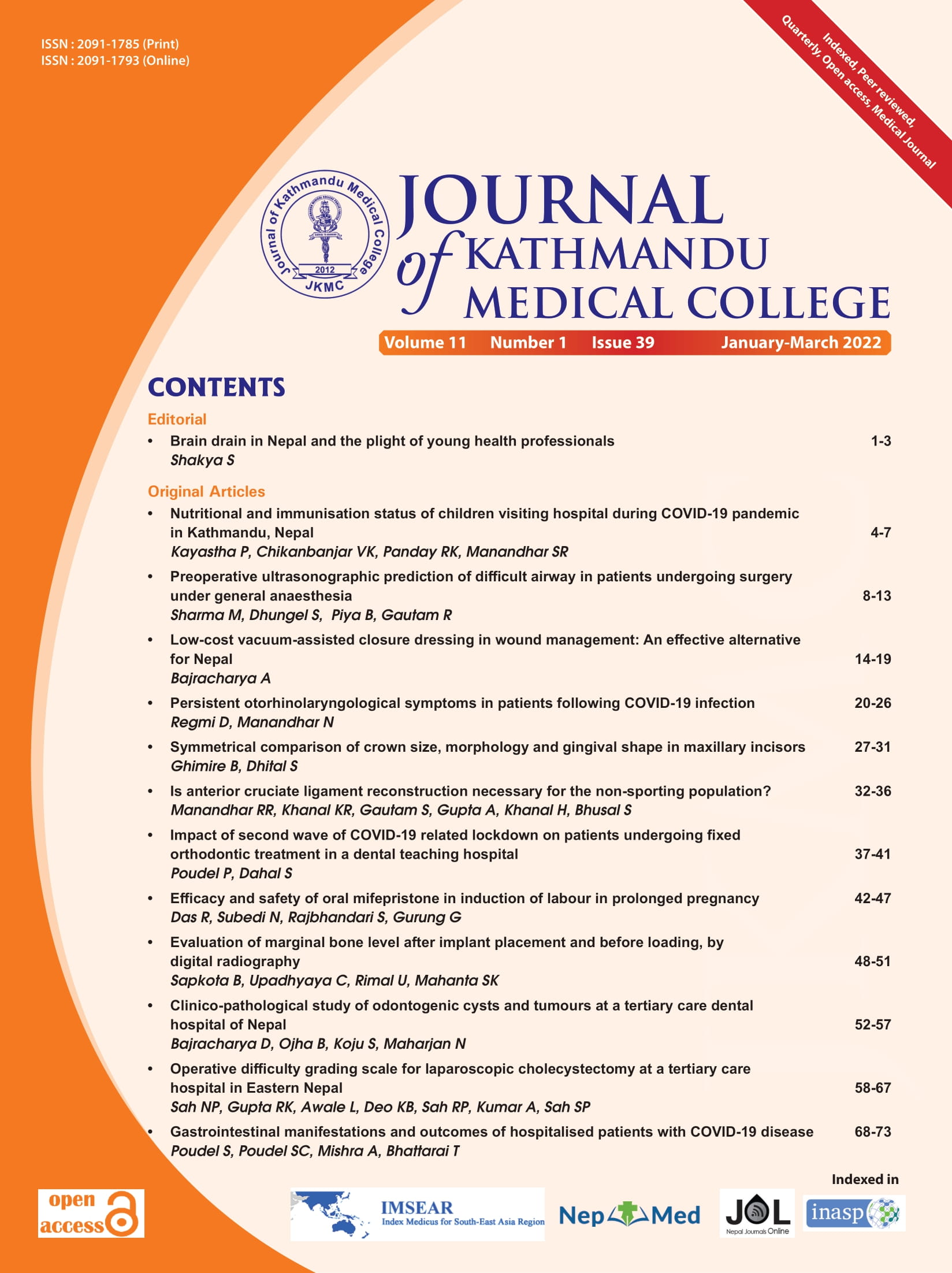Preoperative ultrasonographic prediction of difficult airway in patients undergoing surgery under general anaesthesia
DOI:
https://doi.org/10.3126/jkmc.v11i1.45487Keywords:
Airway, General anaesthesia, UltrasoundAbstract
Background: Preoperative assessment of the airway with ultrasound has come up as a viable option to aid the preanaesthetic airway assessment.
Objectives: To identify reliable ultrasound parameters as predictors of difficult airway in patients undergoing surgery under general anaesthesia.
Methods: A prospective analytical cross-sectional study was conducted at Kathmandu Medical College in 99 consecutive patients scheduled for elective surgery with general anaesthesia and endotracheal intubation from July 2019 to June 2020 after ethical clearance. Three ultrasound parameters were used for this study. Distance from the skin to the anterior aspect of trachea at the level of vocal cords (ANS-VC), the depth of the pre-epiglottic space (PreE), the distance from the epiglottis to the midpoint of vocal cords (EVC) was measured. The PreE/EVC and hyomental distance ratio (HMDR), which is the distance ratio of hyomental distance at neutral and extended head position were calculated. These ultrasonographic parameters were used to predict difficult laryngoscopy Cormack-Lehane (CL) grading 3, 4.
Results: Difficult intubation was seen in 23 (23.2%) as CL grade 3. The authors did not encounter CL grade 4. HMDR and PreE/EVC have been shown to have significant association with CL grading, with a specificity of 71% and 77% respectively and a high negative predictive value of 84.3% and 84.2% respectively. Therefore, it is valuable in predicting difficult intubation. ANS-VC did not have a significant correlation.
Conclusion: Diagnostic predictability of difficult airway is better with HMDR and PreE/E-VC.
Downloads
References
Reed MJ, Dunn MJG, McKeown DW. Can an airway assessment score predict difficulty at intubation in the emergency department? Emerg Med J. 2005 Feb;22(2):99-102. [PubMed | Full Text | DOI]
Shiga T, Wajima Z, Inoue T, Sakamoto A. Predicting difficult intubation in apparently normal patients: A meta-analysis of bedside screening test performance. Anesthesiology. 2005 Aug;103(2):429- 37. [PubMed | Full Text | DOI]
Rucklidge M, Hinton C. Difficult and failed intubation in obstetrics. Contin Educ Anaesth Crit Care Pain. 2012 Apr 1;12(2):86-91. [Full Text]
Kristensen MS. Ultrasonography in the management of the airway: Ultrasonography and the airway. Acta Anaesthesiol Scand. 2011 Nov;55(10):1155-73. [PubMed | Full Text | DOI]
Lixin J, Bing H, Zhigang W, Binghui Z. Sonographic diagnosis features of Zenker diverticulum. Eur J Radiol. 2011 Nov;80(2):e13-9. [PubMed | Full Text | DOI]
Osman A, Sum KM. Role of upper airway ultrasound in airway management. J Intensive Care. 2016;4:52. [PubMed | Full Text | DOI]
Perlas A, Mitsakakis N, Liu L, Cino M, Haldipur N, Davis L, et al. Validation of a mathematical model for ultrasound assessment of gastric volume by gastroscopic examination. Anesth Analg. 2013 Feb;116(2):357-63. [PubMed | Full Text | DOI]
Ezri T, Gewürtz G, Sessler DI, Medalion B, Szmuk P, Hagberg C, et al. Prediction of difficult laryngoscopy in obese patients by ultrasound quantification of anterior neck soft tissue. Anaesthesia. 2003 Nov;58(11):1111-4. [PubMed | Full Text | DOI]
Wojtczak JA. Submandibular sonography: assessment of hyomental distances and ratio, tongue size, and floor of the mouth musculature using portable sonography. J Ultrasound Med. 2012 Apr;31(4):523-8. [PubMed | Full Text | DOI]
Reddy PB, Punetha P, Chalam KS. Ultrasonography - A viable tool for airway assessment. Indian J Anaesth. 2016 Nov;60(11):807-13. [PubMed | Full Text | DOI]
Komatsu R, Sengupta P, Wadhwa A, Akça O, Sessler DI, Ezri T, et al. Ultrasound quantification of anterior soft tissue thickness fails to predict difficult laryngoscopy in obese patients. Anaesth Intensive Care. 2007 Feb;35(1):32-7. [PubMed | Full Text | DOI]
Rana S, Verma V, Bhandari S, Sharma S, Koundal V, Chaudhary SK. Point-of-care ultrasound in the airwayassessment: A correlation of ultrasonographyguided parameters to the Cormack-Lehane Classification. Saudi J Anaesth. 2018 Jun;12(2):292- 6. [PubMed | Full Text | DOI]
Gupta D, Srirajakalidindi A, Ittiara B, Apple L, Toshniwal G, Haber H. Ultrasonographic modification of Cormack Lehane classification for preanaesthetic airway assessment. Middle East J Anaesthesiol. 2012 Oct;21(6):835-42. [Full Text]
Sotoodehnia M, Rafiemanesh H, Mirfazaelian H, Safaie A, Baratloo A. Ultrasonography indicators for predicting difficult intubation: A systematic review and meta-analysis. BMC Emerg Med. 2021 03;21(1):76. [PubMed | Full Text | DOI]
Koundal V, Rana S, Thakur R, Chauhan V, Ekke S, Kumar M. The usefulness of point of care ultrasound (POCUS) in preanaesthetic airway assessment. Indian J Anaesth. 2019 Dec;63(12):1022-8. [PubMed | Full Text | DOI]
Falcetta S, Cavallo S, Gabbanelli V, Pelaia P, Sorbello M, Zdravkovic I, et al. Evaluation of two neck ultrasound measurements as predictors of difficult direct laryngoscopy: A prospective observational study. Eur J Anaesthesiol. 2018;35(8):605-12. [PubMed | Full Text | DOI]
Fulkerson JS, Moore HM, Lowe RF, Anderson TS, Lucas LL, Reed JW. Airway sonography fails to detect difficult laryngoscopy in an adult veteran surgical population. Trends Anaesth Crit Care. 2019 Dec;29:26-34. [Full Text]
Martínez-García A, Guerrero-Orriach JL, Pino-Gálvez MA. Ultrasonography for predicting a difficult laryngoscopy. Getting closer. J Clin Monit Comput. 2021 Apr;35(2):269-77. [PubMed | Full Text | DOI]
Downloads
Published
How to Cite
Issue
Section
License
Copyright © Journal of Kathmandu Medical College
The ideas and opinions expressed by authors or articles summarized, quoted, or published in full text in this journal represent only the opinions of the authors and do not necessarily reflect the official policy of Journal of Kathmandu Medical College or the institute with which the author(s) is/are affiliated, unless so specified.
Authors convey all copyright ownership, including any and all rights incidental thereto, exclusively to JKMC, in the event that such work is published by JKMC. JKMC shall own the work, including 1) copyright; 2) the right to grant permission to republish the article in whole or in part, with or without fee; 3) the right to produce preprints or reprints and translate into languages other than English for sale or free distribution; and 4) the right to republish the work in a collection of articles in any other mechanical or electronic format.




